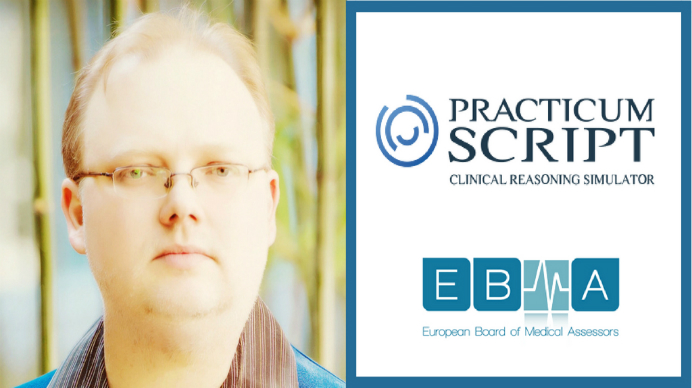
In November 2017, the European Board of Medical Assessors (EBMA) endorsed the Practicum Script clinical case simulator as a useful platform to implement clinical reasoning. According to the audit, conducted by the psychometric analyst Carlos F. Collares, "Practicum Script is an assessment tool for learning that promotes and improves problem-solving and clinical reasoning skills." Prof Collares recognizes its valuable educational impact as a clinical training program directed for senior medical residents and specialists and even points out to its possible application during the graduation cycle.
Madrid/Maastrich July 12, 2018. In a video conference with the Practicum Foundation, and recently arrived from a conference in Exeter (England), Prof. Carlos F. Collares details what links Practicum and EBMA. Eight months ago, a team of EBMA auditors concluded that Practicum Script is a tool that complies with EBMA’s principles to promote clinical reasoning and superior cognitive abilities. Among its strengths, the European entity chaired by Prof Adrian Freeman, who was also present in the English town, mentioned the feedback of the network of clinical thinkers, the possibility of asking a tutor for support in situations of uncertainty, and the validation of hypotheses by a panel of experts.
The pedagogical model of Practicum Script translates into an improvement of clinical reasoning skills. "The users are encouraged to consider several hypotheses and probabilities, and with this tool, they can reflect on the way they think and face decision-making," says Prof Collares. This benefits the ability to face dilemmatic situations and solve complex problems through standardized clinical scenarios. "Practicum uses iterative strategies of reinforcement and experience to update the physician’s clinical knowledge and blends the presented cases with updated references from the scientific literature, allowing users to review different materials to guide the direction that they take." The climate that Prof Collares perceived was one of genuine adherence: "99% of the impressions we received were highly positive."
The quality control cycle that the EBMA audit describes involves the creation of a highly prepared committee of authors responsible for building the cases, a review of these cases led by a panel of 20 experts subjected to the Delphi method, and a final validation by part of the local specialists. As a competitive advantage, it mentions that "since Practicum Script cases are based on real patients, a high degree of authenticity is achieved." Along these lines, the audit emphasizes that the validity of the vignettes is based on an annual systematic review of the cases and an exhaustive consideration of the participants' feedback. From the point of view of who is enrolled in the training program, there is a longitudinal follow-up of the performance through a portfolio of results and – the one thing that called EBMA’s most attention – the possibility of consulting a tutor.
Application during the graduation cycle
Regarding areas for improvement, last year EBMA signaled the confinement of Practicum Script to a niche of Spanish-speaking postgraduate professionals. However, according to Prof Collares, these loose ends will be addressed at the annual conference that the Old Continent’s organization will hold this year in Braga between November 22 and 24. Both parties are working on a pilot project to extend the radius of use of Practicum Script to undergraduate students. "The idea is to utilize the set of universities associated with EBMA to test the usefulness of the tool in the training stage," says Collares. On the other hand, Practicum Script also plans to expand the number of available specialties, which are currently limited to Cardiology, Pediatrics, and Gastroenterology.
Our personalized help center enables you to obtain technical support and help for navigating through the site and using the program.